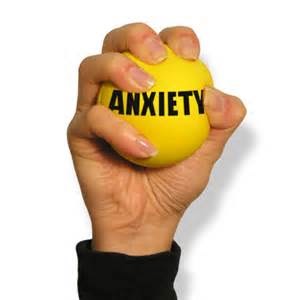Anxiety is a general term for several disorders that cause nervousness,fear, apprehension, and worrying.
 These disorders affect how we feel and behave, and they can manifest real physical symptoms. Mild anxiety is vague and unsettling, while severe anxiety can be extremely debilitating, having a serious impact on daily life.
These disorders affect how we feel and behave, and they can manifest real physical symptoms. Mild anxiety is vague and unsettling, while severe anxiety can be extremely debilitating, having a serious impact on daily life.
People often experience a general state of worry or fear before confronting something challenging such as a test, examination, recital, or interview. These feelings are easily justified and considered normal. Anxiety is considered a problem when symptoms interfere with a person's ability to sleep or otherwise function. Generally speaking, anxiety occurs when a reaction is out of proportion with what might be normally expected in a situation.
|
What causes anxiety?
|
Anxiety is often triggered by stress in our lives. Some of us are more vulnerable to anxiety than others, but even those who become anxious easily can learn to manage it well. We can also make ourselves anxious with "negative self-talk" - a habit of always telling ourselves the worst will happen.
|
How will I recognize anxiety?
|
As well as feeling apprehensive and worried (possibly without knowing why), you may experience some of the following physical symptoms:
- Tense muscles
- Trembling
- Churning stomach
- Nausea
- Diarrhoea
- Headache
- Backache
- Heart palpitations
- Numbness or "pins and needles" in arms, hands or legs
- Sweating/flushing
|
When is anxiety a problem?
|
We all become anxious from time to time. It becomes a problem when it interferes with life in the absence of real threat, or goes on too long after the danger has past.
|
What can I do to feelbetter?
|
- Learn to manage stress in your life. Keep an eye on pressures and deadlines and make a commitment to taking time out from study or work.
- ▪ Learn a variety of relaxation techniques. Physical relaxation methods and meditation techniques really do help.
- Look after your physical self. Eat healthily, get regular exercise and try to keep a regular sleep pattern. Avoid alcohol, cannabis and junk food.
- Practise deep abdominal breathing. This consists of breathing in deeply and slowly through your nose, taking the air right down to you abdomen. Visualise the air travelling right down to your abdomen and say the word "calm" to yourself as you breathe in. Then breathe out slowly and gently through your mouth. As you breathe out visualise the stress and tension leaving your body with your breath and think the word "relax." Deliberately let your muscles go floppy as you breathe out. Take three deep breaths at a time. If you breathe deeply for too long you may feel dizzy from the extra oxygen. You can repeat the three breaths after a short time of breathing normally.
- Learn to replace "negative self talk" with "coping self talk." When you catch yourself thinking something negative like "I can't do this, it's just too hard," try to change it to something more positive, like "This is hard but I can get through it." It can be helpful to think of "changing the tape" that runs through your mind. It is useful to make a list of the negative thoughts you often have and write a list of positive, believable thoughts to replace them.

No comments:
Post a Comment